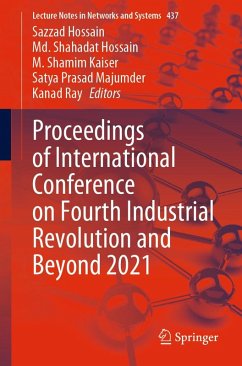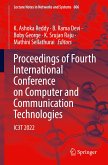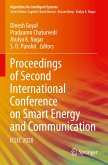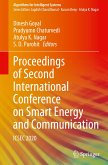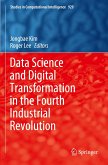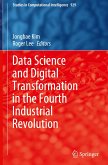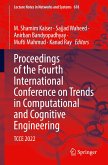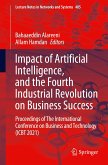Proceedings of International Conference on Fourth Industrial Revolution and Beyond 2021
Herausgegeben:Hossain, Sazzad; Hossain, Md. Shahadat; Kaiser, M. Shamim; Majumder, Satya Prasad; Ray, Kanad
Proceedings of International Conference on Fourth Industrial Revolution and Beyond 2021
Herausgegeben:Hossain, Sazzad; Hossain, Md. Shahadat; Kaiser, M. Shamim; Majumder, Satya Prasad; Ray, Kanad
- Broschiertes Buch
- Merkliste
- Auf die Merkliste
- Bewerten Bewerten
- Teilen
- Produkt teilen
- Produkterinnerung
- Produkterinnerung
This book includes papers in the research area of artificial intelligence, robotics and automation, IoT smart agriculture, data analysis and cloud computing, communication and technology, and signal and natural language processing. The book is a collection of research papers presented at the First International Conference on Fourth Industrial Revolution and Beyond (IC4IR 2021) organized by University Grants Commission of Bangladesh in association with IEEE Computer Society Bangladesh Chapter and Bangladesh Computer Society during December 10-11, 2021.
Andere Kunden interessierten sich auch für
![Proceedings of Fourth International Conference on Computer and Communication Technologies Proceedings of Fourth International Conference on Computer and Communication Technologies]() Proceedings of Fourth International Conference on Computer and Communication Technologies183,99 €
Proceedings of Fourth International Conference on Computer and Communication Technologies183,99 €![Proceedings of Second International Conference on Smart Energy and Communication Proceedings of Second International Conference on Smart Energy and Communication]() Proceedings of Second International Conference on Smart Energy and Communication256,99 €
Proceedings of Second International Conference on Smart Energy and Communication256,99 €![Proceedings of Second International Conference on Smart Energy and Communication Proceedings of Second International Conference on Smart Energy and Communication]() Proceedings of Second International Conference on Smart Energy and Communication257,99 €
Proceedings of Second International Conference on Smart Energy and Communication257,99 €![Data Science and Digital Transformation in the Fourth Industrial Revolution Data Science and Digital Transformation in the Fourth Industrial Revolution]() Data Science and Digital Transformation in the Fourth Industrial Revolution117,99 €
Data Science and Digital Transformation in the Fourth Industrial Revolution117,99 €![Data Science and Digital Transformation in the Fourth Industrial Revolution Data Science and Digital Transformation in the Fourth Industrial Revolution]() Data Science and Digital Transformation in the Fourth Industrial Revolution117,99 €
Data Science and Digital Transformation in the Fourth Industrial Revolution117,99 €![Proceedings of the Fourth International Conference on Trends in Computational and Cognitive Engineering Proceedings of the Fourth International Conference on Trends in Computational and Cognitive Engineering]() Proceedings of the Fourth International Conference on Trends in Computational and Cognitive Engineering183,99 €
Proceedings of the Fourth International Conference on Trends in Computational and Cognitive Engineering183,99 €![Impact of Artificial Intelligence, and the Fourth Industrial Revolution on Business Success Impact of Artificial Intelligence, and the Fourth Industrial Revolution on Business Success]() Impact of Artificial Intelligence, and the Fourth Industrial Revolution on Business Success249,99 €
Impact of Artificial Intelligence, and the Fourth Industrial Revolution on Business Success249,99 €-
-
-
This book includes papers in the research area of artificial intelligence, robotics and automation, IoT smart agriculture, data analysis and cloud computing, communication and technology, and signal and natural language processing. The book is a collection of research papers presented at the First International Conference on Fourth Industrial Revolution and Beyond (IC4IR 2021) organized by University Grants Commission of Bangladesh in association with IEEE Computer Society Bangladesh Chapter and Bangladesh Computer Society during December 10-11, 2021.
Produktdetails
- Produktdetails
- Lecture Notes in Networks and Systems 437
- Verlag: Springer / Springer Nature Singapore / Springer, Berlin
- Artikelnr. des Verlages: 978-981-19-2444-6
- 1st ed. 2022
- Seitenzahl: 792
- Erscheinungstermin: 4. Oktober 2022
- Englisch
- Abmessung: 235mm x 155mm x 40mm
- Gewicht: 1321g
- ISBN-13: 9789811924446
- ISBN-10: 9811924449
- Artikelnr.: 63648260
- Herstellerkennzeichnung Die Herstellerinformationen sind derzeit nicht verfügbar.
- Lecture Notes in Networks and Systems 437
- Verlag: Springer / Springer Nature Singapore / Springer, Berlin
- Artikelnr. des Verlages: 978-981-19-2444-6
- 1st ed. 2022
- Seitenzahl: 792
- Erscheinungstermin: 4. Oktober 2022
- Englisch
- Abmessung: 235mm x 155mm x 40mm
- Gewicht: 1321g
- ISBN-13: 9789811924446
- ISBN-10: 9811924449
- Artikelnr.: 63648260
- Herstellerkennzeichnung Die Herstellerinformationen sind derzeit nicht verfügbar.
Dr. Md. Sazzad Hossain is a distinguished professor, a researcher, an academic teaching advisor with extensive experience in ICT sector, and a writer. Currently, he is working as a full-time member of University Grants Commission of Bangladesh. He is also a director of the Board of Directors of Bangladesh Communication Satellite Company Ltd (BCSCL). Dr. Sazzad is a masterly instructor in ICT field with enormous knowledge on subject matter. He joined as a professor as well as the head of the Department of Computer Science and Engineering at University of Liberal Arts Bangladesh in December 2009. He received his Ph.D. in Electrical and Computer Engineering from Portland State University, Oregon, USA, which is one of the top-ranking universities of the world. His doctoral dissertation in quantum computing takes background and ideas from several fields of physics, mathematics, computer science, computer engineering, and biology. He completed his Master's in Electrical and Computer Engineering from the same university in the USA. He received his Bachelor of Science in Electrical System Network Engineering from Moscow Technical University (popularly known as Moscow Power Institute), Moscow, Russia. He also lent his teaching and research experiences in many universities and institutes as a visiting faculty/researcher/guest speaker. He has twenty-six (26) years of experience in information technology. He has served as a consultant to several nationally and internationally renowned ICT companies, government agencies, and organizations. His research interest includes quantum computing, quantum algorithms, quantum entanglement, de-coherence, natural computing, fault-tolerant computing, theoretical computer science, nanotechnology, low-power VLSI design, reversible logic, software engineering, Internet of things (IoT), artificial intelligence, robotics, and human-robot interaction. He has authored more than 50 research articles in peer-reviewed international journals and conference proceedings. Professor Dr. Mohammad Shahadat Hossain is serving as the professor of Computer Science and Engineering at the University of Chittagong, Bangladesh. He did both his M.Phil. and Ph.D. in Computation from the University of Manchester Institute of Science and Technology, UK. He is the awardee of a number of fellowships including Commonwealth, Tyndall, and Erasmus Mundus. He is also the holder of Erasmus Mundus Scholar Visiting Professor in Europe. He successfully completed a number of research projects. Recently, he was awarded a prestigious Swedish Research Council grant for the project entitled "A Belief Rule Based DSS to Assess Flood Risks using Wireless Sensor Networks". His interest of research is in the areas of artificial intelligence, expert systems, pervasive computing, health informatics, deep learning, Internet of things (IoT), big data, e-government, hyper-optimization, and philosophy of computing. He has published 170+ scholarly articles in the reputed international journals and conferences. Many of his papers obtained the best paper award. Professor Hossain is usually invited to deliver talks in various countries of the world. He is the author of a number of books. He is the senior member of IEEE, USA, and the member of British Computer Society. Dr. M Shamim Kaiser is currently working as a professor at the Institute of Information Technology of Jahangirnagar University, Savar, Dhaka-1342, Bangladesh. He received his Bachelor's and Master's degrees in Applied Physics Electronics and Communication Engineering from the University of Dhaka, Bangladesh, in 2002 and 2004 respectively, and the Ph.D. degree in Telecommunication Engineering from the Asian Institute of Technology (AIT), Pathum Thani, Thailand, in 2010. He worked as a postdoc fellow in the Big Data and Cyber Security Lab of Anglia Ruskin University, UK, from 2017-2018. He also worked as a special research student at theWireless Signal Processing and Networking Lab (Adachi Lab) of Tohoku University, Japan, in 2008. His current research interests include data analytics, machine learning, wireless network & signal processing, cognitive radio networks, big IoT data, health care, neuroinformatics, and cyber security. He has authored more than 170 papers in different peer-reviewed journals and conferences. He is an academic editor of Plos One Journal, an associate editor of the IEEE Access and Cognitive Computation Journal,and the guest editor of Brain Informatics Journal, IJACI (IGI Global), Electronics MDPI, Frontiers in Neuroinformatics, and Cognitive Computation Journal. Dr. Kaiser is a life member of Bangladesh Electronic Society, Bangladesh Physical Society, and NOAMI. He is also a senior member of IEEE, USA, and IEICE, Japan, and an active volunteer of the IEEE Bangladesh Section. He is the founding chapter chair of the IEEE Bangladesh Section Computer Society Chapter. Dr.Satya Prasad Majumder joined the position of the vice chancellor of Bangladesh University of Engineering and Technology (BUET) on June 2020. He is a professor of the Department of Electrical and Electronic Engineering (EEE), BUET. Since joining BUET in 1981, he served in various positions in the department, faculty, and university levels, including the head of the EEE department at BUET from June 2006-May 2008. He was the dean of the Faculty of EEE, BUET, during June 2010 to June 2012. He served as a visiting professor in the Faculty of Engineering (FoE) of Multimedia University (MMU), Cyberjaya, Selangor, Malaysia, during January 1999 to July 2002. He was a visiting research professor in the department of Electrical Engineering of Gunma University (Japan) during December 2001 to January 2002. He was a visiting researcher in the department of Information Engineering of University of Parma (Italy) during 1996 and 1997. He worked as a consultant to the South Asian Association for Regional Co-operations (SAARC) & Dhaka Chamber of Commerce (DCC). He received the B.Sc. (1st class, 4th) and M.Sc. in Electrical & Electronic Engineering from BUET, Bangladesh, in 1981 and 1985, respectively. In 1993, he obtained his Ph.D. degree in Optical Fiber Communication Engineering from the Indian Institute of Technology (IIT), Kharagpur, India. His research interests include opto-electronics & photonics, optical fiber communication systems, DWDM optical networks, soliton propagation, broadband wireless communications, and mobile and infrared networks. He supervised more than 50 M.Sc. theses and 6 Ph.D. dissertations and published more than 200 research papers in internationally reputed referred journals and conference proceedings. Kanad Ray (Senior Member, IEEE) received the M.Sc. degree in physics from Calcutta University and the Ph.D. degree in physics from Jadavpur University, West Bengal, India. He has been a professor of Physics and Electronics andCommunication and is presently working as the head of the Department of Physics, Amity School of Applied Sciences, Amity University Rajasthan (AUR), Jaipur, India. His current research areas of interest include cognition, communication, electromagnetic field theory, antenna and wave propagation, microwave, computational biology, and applied physics. He has been serving as an editor for various Springer book series. He was an associate editor of the Journal of Integrative Neuroscience (The Netherlands: IOS Press). He has been a visiting Professor to UTM & UTeM, Malaysia, and a visiting scientist to NIMS, Japan. He has established MOU with UTeM, Malaysia; NIMS, Japan; and University of Montreal, Canada. He has visited several countries such as the Netherlands, Turkey, China, Czechoslovakia, Russia, Portugal, Finland, Belgium, South Africa, Japan, Singapore, Thailand, and Malaysia for various academic missions. He has organized various conferences such as SoCPROS, SoCTA, ICOEVCI, andTCCE as the general chair and a steering committee member.
Part 1: Artificial Intelligence for Detection and Prediction.- Chapter 1. ColorNet: A Deep Learning Based Approach to Colorize the Historical Documentaries of Bangladesh.- Chapter 2. A Methodology for Recommending In-Vehicle Coupons Incorporating Machine Learning Algorithms for Efficient Financial Schemes.- Chapter 3. A Deep Convolutional Neural Network-Based Approach to Classify and Detect Crack in Concrete Surface Using Xception.- Chapter 4. Machine Learning-based Physical Exercise Identification with Heuristic Optimized Features Prioritization.- Chapter 5. Modelling Lips-State Detection Using CNN for Non-Verbal Communications.- Chapter 6. Depression Level Prediction during Covid-19 Pandemic among the People of Bangladesh using Ensemble Technique: MIRF Stacking and MIRF Voting.- Chapter 7. HandFruitNet: A Deep Learning Based Model for Fruits Classification from Hand.- Chapter 8. Entrepreneurship education and entrepreneurial intention of business graduates: Does Artificial Intelligence matter?.- Chapter 9. COVID-19 Chest X-Ray Classification with Augmented GAN.- Part 2: Artifical Intelligence for Smart City Applications.- Chapter 10. Computer Vision-based Waste Detection and Classification for Garbage Management and Recycling.- Chapter 11. A System dynamics approach of decisive policy measures for sustainable municipal solid waste management in Khulna city of Bangladesh.- Chapter 12. Prediction of Soil Nutrients using Hyperspectral Satellite Imaging.- Chapter 13. A Machine Learning Approach to Season Prediction Based on Agricultural Input Orders.- Chapter 14. Assessment of Water Quality in Smart City Environment Leveraging ML-IoT.- Chapter 15. Smart IoT-Biofloc water management system using Decision regression tree. etc.
Part 1: Artificial Intelligence for Detection and Prediction.- Chapter 1. ColorNet: A Deep Learning Based Approach to Colorize the Historical Documentaries of Bangladesh.- Chapter 2. A Methodology for Recommending In-Vehicle Coupons Incorporating Machine Learning Algorithms for Efficient Financial Schemes.- Chapter 3. A Deep Convolutional Neural Network-Based Approach to Classify and Detect Crack in Concrete Surface Using Xception.- Chapter 4. Machine Learning-based Physical Exercise Identification with Heuristic Optimized Features Prioritization.- Chapter 5. Modelling Lips-State Detection Using CNN for Non-Verbal Communications.- Chapter 6. Depression Level Prediction during Covid-19 Pandemic among the People of Bangladesh using Ensemble Technique: MIRF Stacking and MIRF Voting.- Chapter 7. HandFruitNet: A Deep Learning Based Model for Fruits Classification from Hand.- Chapter 8. Entrepreneurship education and entrepreneurial intention of business graduates: Does Artificial Intelligence matter?.- Chapter 9. COVID-19 Chest X-Ray Classification with Augmented GAN.- Part 2: Artifical Intelligence for Smart City Applications.- Chapter 10. Computer Vision-based Waste Detection and Classification for Garbage Management and Recycling.- Chapter 11. A System dynamics approach of decisive policy measures for sustainable municipal solid waste management in Khulna city of Bangladesh.- Chapter 12. Prediction of Soil Nutrients using Hyperspectral Satellite Imaging.- Chapter 13. A Machine Learning Approach to Season Prediction Based on Agricultural Input Orders.- Chapter 14. Assessment of Water Quality in Smart City Environment Leveraging ML-IoT.- Chapter 15. Smart IoT-Biofloc water management system using Decision regression tree. etc.

